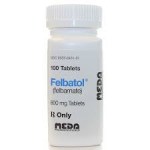- Type of Drug: Anticonvulsant
- Prescribed for: Partial seizures; Lennox-Gastaut Syndrome in children
Felbamate General Information
Felbamate is related to the older tranquilizer/sedative Meprobamate (Miltown). The exact way it works is not known, but Felbamate raises the seizure threshold and prevents the spread of the seizure in the brain, similarly to other anticonvulsant, medicines. Felbamate is well absorbed into the bloodstream. About half of each dose passes out of the body through the kidneys and the other half is eliminated from the body by being broken down in the liver. Because of the potential dangers associated with Felbamate, this medicine should only be used when other seizure medicines have failed.
Felbamate Cautions and Warnings
More than 20 cases of aplastic anemia (severe reductions in white blood cell count) – including 3 deaths – occurred in people taking Felbamate for 5 weeks or more. Ordinarily, this is a rare side effect, happening in only 2 to 5 per 1 million people. This drug should not be used unless it is essential for your treatment and its benefits outweigh its risks.
- Dosages of Felbamate should be only gradually reduced or replaced by other anticonvulsant medicines; this drug should never be suddenly stopped because, seizures may become more frequent.
- People who are allergic to Felbamate or related medicines should not take this drug.
- Felbamate may increase your sensitivity to the sun. Wear protective clothing and use sunscreen while taking this drug.
- People with severe liver or kidney disease may require lower doses of Felbamate.
Possible Side Effects
- Most common: sleeplessness, fatigue, headache, anxiety, dizziness, nervousness, tremors, depression, unusual walk, upset stomach, nausea, vomiting, diarrhea, constipation, weight loss, fever, liver inflammation, taste changes, loss of appetite, hiccups, upper respiratory infection, runny nose, sore throat, coughing, double vision, middle ear infections, loss of urine control, black- and-blue marks, abnormal thinking, emotional instability, and pinpointed pupils.
- Less common: facial swelling, chest pain, generalized pain, tingling in the hands or feet, weakness, dry mouth, stupor, blurred or abnormal vision, sinus inflammation, bleeding between menstrual periods, urinary tract infections, muscle aches, and poor muscle) control or coordination.
- Rare: weight gain and appetite increase, feelings of ill health, flulike symptoms, drug allergies, heart palpitations, rapid heartbeat, euphoria (feeling “high”), suicidal tendencies, migraines, inflammation of the esophagus, swollen lymph glands, reduced levels of white blood cells and blood platelets, reduced body sodium and/or potassium, itching, rash, swollen skin eruptions, swelling of tissue inside the mouth, Stevens-Johnson syndrome, unusual muscle movements, and unusual sensitivity to the sun.
Drug Interactions
• Felbamate increases the breakdown of Carbamazepine by the liver (by as much as 40 percent). This increased breakdown becomes obvious within the first 2 to 4 weeks after you start taking Felbamate. Carbamazepine dose adjustment is necessary. When this combination is taken together, the amount of Felbamate in the blood is also reduced by almost 50 percent because the drug is cleared from the body more quickly.
• Felbamate decreases the rate at which Phenytoin is broken down in the liver. Your daily Phenytoin dosage may have to be reduced by as much as 30 percent to account for this effect. When this combination is taken together, the amount of Felbamate in the blood is reduced by almost 50 percent because the drug is cleared from the body more quickly.
• Felbamate increases the amount of Valproic Acid in the blood. Unlike other anticonvulsants, Valproic Acid does not affect Felbamate.
Food Interactions
Felbamate is best taken on an empty stomach but may be taken with food if it upsets your stomach.
Felbamate Usual Dose
Adult and Adolescent (age 14 and older): 1200 to 3600 mg per day divided into 3 or 4 doses.
Child (age 2 to 13): 6.8 to 20.5 mg per pound per day divided into 3 or 4 doses.
Overdosage
The only overdose effects that have been reported are upset stomach and increased heart rate. No serious effects have been seen, but one could expect usual drug side effects in overdose situations. Call your doctor, local poison control center, or hospital emergency room for more information. If you go to the emergency room for treatment, ALWAYS bring the medicine bottle.
Felbamate Special Information
- Do not take more Felbamate than your doctor has prescribed.
- Felbamate can cause drowsiness; be careful when driving or performing complicated tasks.
- Avoid long exposure to the sun while taking Felbamate. Call your doctor if you develop any unusual or bothersome side effects.
It is important to maintain good dental hygiene while taking Felbamate and to use extra care when using your toothbrush or dental floss because this drug can cause swollen gums. See your dentist regularly while taking this medicine.
If you forget to take a dose of Felbamate, take it as soon as you remember. If it is almost time for your next dose, take one dose right away and another in 3 or 4 hours, then go back to your regular schedule. Do not take a double dose.
Special Populations
Pregnancy/Breast-feeding
This drug may cross into the fetal blood circulation. When the drug is considered essential by your doctor, its potential benefits must be carefully weighed against its risks.
Felbamate passes into breast milk, but its effect on nursing infants is not known. Consider bottle-feeding your baby because of possible effects on the nursing infant.
Seniors
Older adults, especially those with liver, kidney, or heart disease, may be more sensitive to the effects of this drug and should take doses in the low. end of the usual dosing range.

